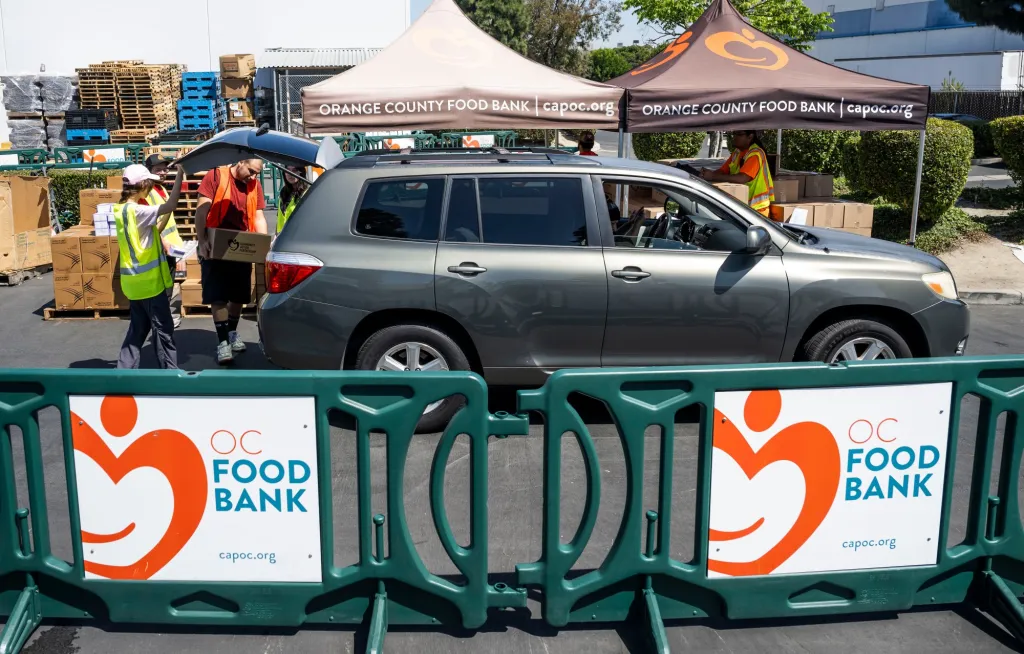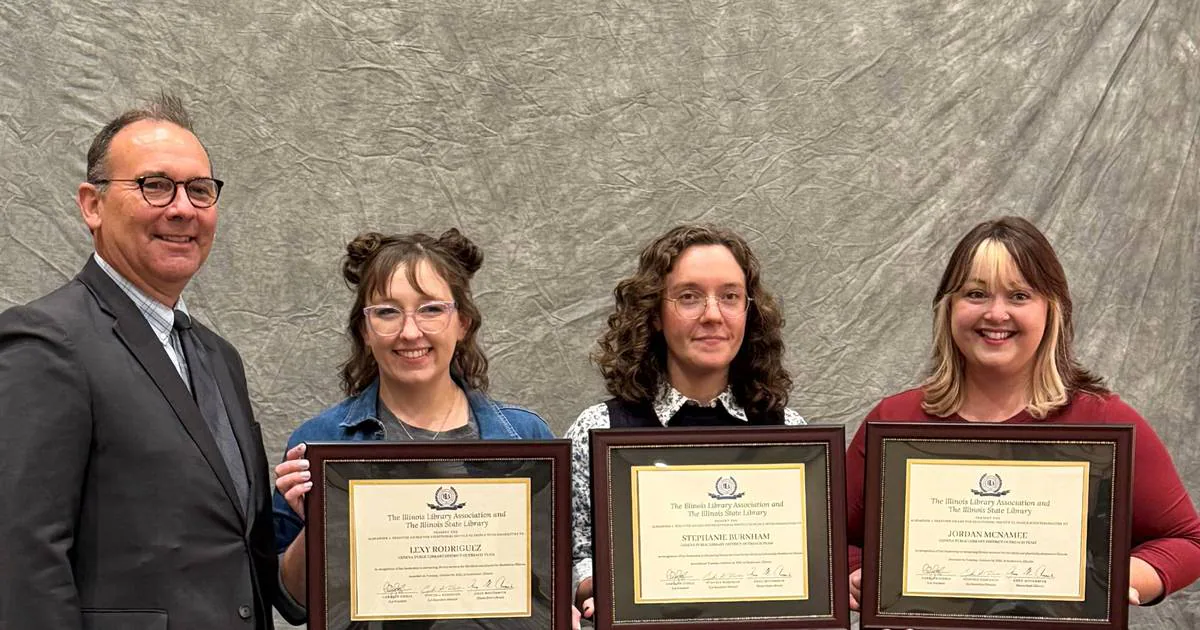Copyright Santa Ana Orange County Register

For leaders of nonprofit food banks and food pantries in Orange County, the next few weeks could be a glimpse into the future. Late last week about 310,000 locals who use CalFresh were told that the program that provides lower-income people with money to buy food will go dark starting Nov. 1, a victim of the government shutdown. The resource – known nationally as the Supplemental Nutrition Assistance Program, or SNAP – isn’t dead. Food money could return when the federal government resumes or if Congress passes a spending carveout to help the roughly 42 million Americans who use federal dollars to eat. But, locally, even a temporary closure of CalFresh will push a flood of hungry people toward free food providers, a countywide network of roughly 600 food pantries and food banks. Food, after all, isn’t a negotiable need. And since local food providers already help about 700,000 people a month (including many who also use CalFresh), the expected extra demand represents a potentially huge hurdle. “It won’t be easy,” said Claudia Bonilla Keller, chief executive of Second Harvest Food Bank, which collects and grows food and distributes it to some 380 pantries and other outlets. “But our job is to feed people who need it, full stop,” she added. “So that’s what we will do.” But the expected interruption at CalFresh also is an example of what is widely viewed as a shift in direction, if not attitude. Food aid has been a staple of the federal government since at least 1939, when Washington started sending money to help poor people eat and to farmers who feed them. The shutdown notice sent out this month is the first in the program’s history. And it might not be the last. Federal assistance for basic safety net items – food, health care and housing – will be reduced under rules passed this year in the federal spending package known as the Big Beautiful Bill. Though the changes are complex and will kick in over the next two years (tax cuts earlier; spending cuts after the next two national elections), some of the broad contours are simple and, in some cases, immediate – less money and tougher restrictions for programs that help the poor. The non-partisan Congressional Budget Office projects that the bottom 10% of American earners will lose roughly $1,200 a year in cuts to government programs like Medicaid and food assistance, while the top 10% will see their income increase by $13,600 from tax cuts. For nonprofits, those changes represent a potentially new era. The type of need shift expected to play out as CalFresh goes dark hints at what might be the new normal in coming years. With that in mind, we asked the leaders of several local nonprofits what they see happening – particularly in the area of nutrition – in 2026 and beyond. We got responses from Second Harvest’s Bonilla Keller; Gregory Scott, president and CEO of Community Action Partnership of OC (CAP OC), which runs the Orange County Food Bank and other programs; Mike Learakos, CEO of Abound Food Care, which helps nonprofit food networks get excess food from restaurants, groceries and others; and LaVal Brewer, CEO of South County Outreach, which provides food and financial services to people in need in southern Orange County. None whined. A few noted that new tax cuts could lead to more donations, though all said the nonprofit sector can’t come close to matching what is being cut from the federal budget. And all expressed a wariness about what’s next. Here are some of their answers, edited for length: What’s the best-case scenario for your organization next year? Worst-case? Why? Scott: “The best-case scenario for CAP OC is that funding remains stable or, ideally, increases to meet the growing need across Orange County. While this is not the pandemic, it feels very similar. … Inflation has pushed more families into crisis, and the demand for food, rental assistance and energy support remains high. “In the best scenario, available resources would finally align with the level of need in our community. “The worst-case scenario is that funding cuts continue or become even deeper. If major programs such as Medicaid or CalFresh face additional reductions, families will struggle even more, and CAP OC could be forced to make difficult operational decisions, including layoffs or scaling back essential services.” Learakos: “The best-case scenario is that the current situation and the uncertainty that surrounds us finally leads to an understanding that our charitable and relief food system is not resilient enough to handle the need. “The worst-case scenario is not only an interruption or delay in food assistance… but it’s a scenario in which we go right back to ‘business as usual;’ back to trying to ‘feed and fund’ our way out of poverty.” Bonilla Keller: “We’re finishing the year in good financial shape, which, given everything that’s happened this year, is excellent. If we can continue that for next year – and meet our mission – that would be the best case. “The worst case is that we finish in a deficit. I don’t ever say cut back services, but we will have to get creative, and to steward the money and donations we get as well as we always have. “We are going into 2026 with a lot of uncertainty. And it’s not just us. The legislation that’s been passed could mean more uncertainty for people with food insecurity.” Brewer: “The best-case scenario is that we don’t see any further reduction in government funding — beyond the current cuts (e.g., to SNAP) — that can cause disruptions in service. If the level of funding remains the same as this year, and our fundraising continues apace, we can serve the same number of people we are currently serving.” The new federal budget bill doesn’t immediately cut SNAP or Medicaid (MediCal in California), but it does impose tighter rules related to citizenship and work requirements, among other things. As those rules kick in (over the next 11-plus months), what will they mean for the people your organization helps? Scott: “If these rules move forward, they will hit the working poor the hardest. There are moments in life when people face gaps in employment, whether from reduced hours, caregiving, illness, or layoffs. These new requirements could cause families to lose healthcare or food assistance at the very moments they need them most. “… The challenge will be finding steady work or volunteer placements quickly enough to keep food on the table, and many will inevitably turn to community food programs already stretched thin.” Bonilla Keller: “Documentation status has not affected the emergency food system in Orange County, at least not yet. The reality is we feed hungry people. That is our position. If you’re not going to qualify to get SNAP benefits, that’s not really connected to us. We feed people. All people.” What message, if any, are you sharing with clients (and donors and employees) regarding 2026? Scott: “There is a lot of fear heading into next year, including concerns about funding, jobs, immigration, and stability. Our goal is to help people navigate that uncertainty through education and empowerment. “For donors and partners, we are emphasizing how essential their support is. Federal funds may fluctuate, but private donors and community advocates can help fill the gaps. … We are sharing real stories that show how generosity translates to stability for families facing hardship. “For staff, we are focused on maintaining morale and reinforcing our shared mission to be a constant source of hope and stability when everything else feels uncertain.” Bonilla Keller: “We don’t serve clients directly; we serve pantry operators. And, given what’s happening this weekend and beyond, we’re telling (pantry operators) that you could see an influx of folk. “We need to get through the end of ’25 before we have a message for next year. And next year could be very uncertain, for a lot of different reasons.” Some of the lesser-discussed details of the new budget affect student loans. Specifically, there are new caps on how much students can borrow and new rules that wipe out hardship exemptions and revive pre-Biden-era school loan repayment rules. Given that food pantries exist on every college campus in Orange County, will those changes create more food insecurity? Scott: “Capping how much students can borrow and removing hardship exemptions (for loan repayments) will likely worsen food insecurity among college students. Many are already struggling to afford tuition, books, housing, and basic necessities. If they are forced to cover more costs out of pocket, there will be even less money left for essentials like food.” Bonilla Keller: “Yes.” There are several changes to tax rules that might benefit parents and moderate-income people in Orange County – a temporary bump in SALT deductions, bigger standard deductions, bigger child tax credits, a $6,000 permanent deduction for people age 65 and older. Could those result in more donations to nonprofits? Scott: “These changes will not have a direct impact on CAP OC’s operations but could indirectly influence both the families we serve and donor behavior. “For some households, higher child tax credits or standard deductions may offer short-term relief, helping them keep food on the table. On the donor side, these adjustments could encourage increased charitable giving. Bonilla Kellar: “I think so! Our food bank enjoys such a wide range of folk who support us, from people able to make large gifts, and others who can send us $10 a month, to everybody in between. If the tax benefits enable them to give more, that would be wonderful.” There’s a lot of fear in the air – fear of speaking out, fear of being swept up in ICE raids, etc. How is that affecting your clients? Scott: “Fear has become one of the biggest barriers to accessing help. Families are afraid of being exposed when they seek food or rental assistance. We have seen participation at some food distributions decline even as need continues to rise, especially in neighborhoods with large immigrant populations. Parents are skipping appointments for diapers or utilities because they do not want their names recorded.” Are you afraid? Could your organization be targeted – by the IRS or other federal agencies – because of the work you do? Scott: “Not afraid, but vigilant. Advocacy can make people uncomfortable, yet CAP OC operates with full transparency, board oversight, and regular audits. We are proudly nonpartisan and work with both sides of the aisle to ensure families have access to food, housing, and hope… “We lead with integrity, and that has earned us credibility across political lines.” Bonilla Kellar: “No. Regardless of what side of the aisle you’re on, politically, everybody agrees that everybody needs to eat. Hunger has historically been a non-partisan issue and we’re a non-partisan organization. “I do fear for people in our community who are experiencing hunger, no matter who they are. I fear for college students; young kids who can’t get enough to eat; our seniors. The only fear I have is that we’re not meeting those needs. “This period feels very pandemic-y. There’s so much in the air. We’ll probably see some new people next year, needing food for the first time. I fear that.” What else should be asked? Brewer: “You didn’t ask how the current developments arising from the federal shutdown — which is expected to eliminate SNAP benefits for the month of November 2025, at least — impact those needing support…. “South County Outreach is financially and operationally strong, and so far, we’ve never had to turn anyone away. But if demand continues to rise, we may have to reduce the amount of food provided per client. That would place additional strain on families, forcing them to visit multiple food pantries, many of which may not be equipped to handle the increased volume. “Our mission is simple: No one in Orange County should go hungry. Yet without SNAP benefits, many of our neighbors will face real hardship, including going to bed hungry. Poverty in our region is well-hidden, but it’s very real. As a community, we need to decide what kind of world we want to live in, because we should never accept one where our neighbors are hungry.”



